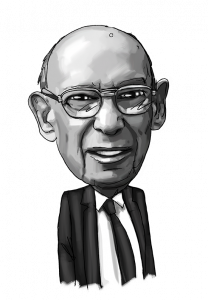- October 22, 2018
- 3:44 pm
- Al Gini
- no comments
Drucker On Leadership
Peter F. Drucker has been hailed as a guru and a sage. According to best-selling management author Jim Collins, “there are two ways to change the world: with the pen (the use of ideas) and with the sword (the use of power). Drucker chose the pen.” In a career that spanned nearly 70 years, Drucker was a Professor initially of philosophy, and then later management, a consultant, a public lecturer, author of 34 books and a long time regular contributor to the Harvard Business Review, the Wall Street Journal, The Atlantic Monthly, and The Economist.
Referring to himself as a “social ecologist”, Drucker dissected, described, defined, and redefined the functional and dysfunctional behavior of business, companies and the people who worked there. Business Week dubbed him “The Man Who Invented Management”, and both critics and fans alike agree that it is “difficult to cite a significant modern management concept that was not first articulated, if not invented by Drucker”. His work provides a road map for the field of management for the field of business and institutional life of all kinds.
Most critics agree that the book that initially established Drucker’s reputation was the 1954 publication of The Practice of Management. Drucker claims that he wrote the book for two separate but unavoidably connected audiences: managers and general public. His first aim was to create practical text for individuals in management positions which would enable them to examine their own work, diagnose and improve on their weaknesses, and improve the effectiveness of the enterprise they are responsible for. Second, he wrote the book to educate those uneducated in the task and jobs of management. Drucker was convinced that “ignorance of the function of management, of its work, of its standards and of its responsibilities is one of the most serious weaknesses an industrial society…”
In the Preface of the Chinese translation of The Practice of Management Drucker argues that this text was successful specifically because it was the first management book to look at the field as a whole. It was the first to attempt “to depict management as a distinct function, managing as specific work, and being a manager as a distinct responsibility.” According to Drucker The Practice of Management portrays the three critical dimensions of the discipline and job of management.
- Management in regard to “business” and the obligation to produce beneficial financial results.
- Management in regard to the human and social “organization” which employee people, develops them, pays them and organizes them for productivity.
- Management as “institution” embedded in a community and is both “affected by” and “affects” the public interest.
Drucker posits that management as a discipline and a job arose out of the technological capabilities, needs, and necessities of the Industrial Revolution. Before the mid-nineteenth century the phenomenon of management was unknown. The need for knowledgeable, value based authority figures who were capable of organizing people/workers in the joint performance of a common task did not arise until the needs industrialization and the economy of scale required the establishment and institutionalization of this new class of worker. Drucker points out that as late as 1850 when Karl Marx was writing Das Kapital, the largest manufacturing company in the area was the Manchester Cotton Mill employing fewer than 300 people and ironically, it was owned by Marx’s friend and collaborated Friedrich Engles.
According to Drucker, without management, “resources of production” remain resources and never become actual production. Managers are the indispensable determinate of productivity, efficiency and survival. Management, said Drucker, is grounded in the nature of the modern industrial system and in the needs of the modern business enterprise. Its goal is competence, integrity, productivity, and economic performed (profits).
No matter what the enterprise or industry, for Drucker, the fundamental task of management remains the same: To make people capable of joint performance through common goals, common values, the right structure, and the training and development they need to perform and respond to change. Management is a cultural practice as well as a science and a profession. Management is about action and adaptive concerted behavior. Management is about communication. It is about the establishment of skill sets. It is about offering discretion and critique. It is about fostering trust. It is about a bag of techniques, skills, and analytical skills. It is about accountability. It is about managing the work, (the business), the workers, and other managers to do well. It is about increased livelihood, and the advancement of the human spirit through material advancement. Management is both a creature of the economy and a creator as well. It is about due concern and consideration of both one’s physical, financial and human resources. It is about, to use Frederick Taylor’s words, “working smarter” rather than just “working harder”. Frederick W. Taylor, at the turn of the 20th century, was one of the first thinkers to look at the “business management” and the “management of business” as an institution that has profound economic and cultural effects on both business and society.
Although Drucker initially posited that the institution of management arose as a direct response to the needs of business, the task of management is applicable to all public-service organizations as well. Every organization, says Drucker, exists for the sake of society. No institution exists by itself and is an end in itself. The job of management is to monitor and guide the actions and effectiveness of institutions and human beings. Management he says is always and only about human beings. “Its task is to make people capable of joint performance, to make their strengths effective and their weaknesses irrelevant. This is what organization is all about, and it is the reason that management is the critical, determining factor.” Moreover, Drucker argues, that management also expresses a central and indispensable belief of western society: Economic change (improvement) is a powerful engine for human betterment, an increased personal livelihood, and social justice. As Jonathan Swift overstated the case: “Whoever makes two blades of grass grow where only one grew before deserves better of mankind than any speculative philosopher or metaphysical system builder.” For Drucker, the purpose of “an organization and the grounds for all management authority is to enable the common person to do uncommon things, and to make human strength productive.

